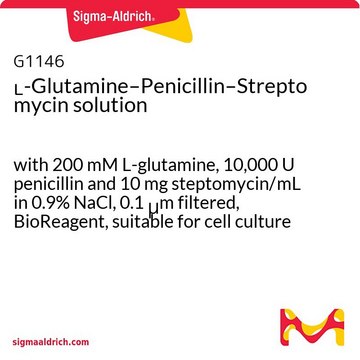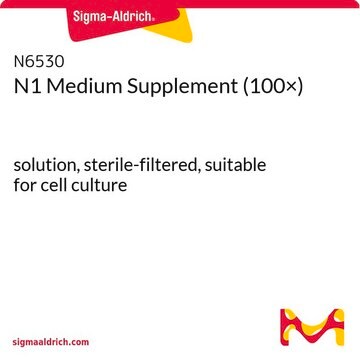G6784
ʟ-Glutamine–Penicillin–Streptomycin
solution, suitable for cell culture, BioReagent
Synonyme(s) :
Pen/Strep, Penicillin/Streptomycin
About This Item
Produits recommandés
product name
L-Glutamine–Penicillin–Streptomycin solution, L-glutamine 200 mM, streptomycin 10 mg/mL, penicillin 10,000 units, 0.1 μm filtered, BioReagent, suitable for cell culture
Source biologique
synthetic
Niveau de qualité
Description
stabilized
Stérilité
0.1 μm filtered
Gamme de produits
BioReagent
Forme
liquid
Composition
L-glutamine, 200 mM
penicillin, 10,000 units
streptomycin, 10 mg/mL
Technique(s)
cell culture | mammalian: suitable
Impuretés
endotoxin, tested
Spectre d'activité de l'antibiotique
Gram-negative bacteria
Gram-positive bacteria
Mode d’action
cell wall synthesis | interferes
protein synthesis | interferes
Température de stockage
−20°C
Catégories apparentées
Application
Actions biochimiques/physiologiques
Antimicrobial spectrum: This product acts against both gram-negative and gram-positive bacteria.
Composants
Code de la classe de stockage
12 - Non Combustible Liquids
Classe de danger pour l'eau (WGK)
WGK 2
Point d'éclair (°F)
Not applicable
Point d'éclair (°C)
Not applicable
Équipement de protection individuelle
Eyeshields, Faceshields, Gloves, multi-purpose combination respirator cartridge (US)
Certificats d'analyse (COA)
Recherchez un Certificats d'analyse (COA) en saisissant le numéro de lot du produit. Les numéros de lot figurent sur l'étiquette du produit après les mots "Lot" ou "Batch".
Déjà en possession de ce produit ?
Retrouvez la documentation relative aux produits que vous avez récemment achetés dans la Bibliothèque de documents.
Les clients ont également consulté
Articles
Importance and uses of glutamine in hybridoma and mammalian cell culture
Notre équipe de scientifiques dispose d'une expérience dans tous les secteurs de la recherche, notamment en sciences de la vie, science des matériaux, synthèse chimique, chromatographie, analyse et dans de nombreux autres domaines..
Contacter notre Service technique








